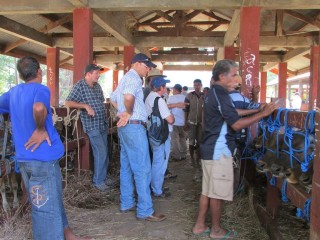 A group of Northern Territory cattle producers has spent the past week visiting their counterparts in Indonesia’s eastern provinces, working to understand the challenges they face and what can be done to improve the productivity and profitability of their cattle farming businesses.
A group of Northern Territory cattle producers has spent the past week visiting their counterparts in Indonesia’s eastern provinces, working to understand the challenges they face and what can be done to improve the productivity and profitability of their cattle farming businesses.
The Northern Territory Cattlemen’s Association has been at the forefront of Australian industry efforts to build strong relationships within Indonesia’s cattle sector.
A central plank of those efforts has been the association’s successful Indonesia Australia Pastoral Industry Student Program, which in 2012 saw eight students from two universities spend six weeks on NT cattle stations, and this year expanded to involve 15 students from five universities.
Last week’s tour was organised in response to an Indonesian Government invitation for Australian cattle producers to visit Indonesia’s eastern provinces, which have been formally identified as priority areas for the future development of Indonesia’s cattle herd.
The delegation of NT cattle producers was joined by a number of past students from the Indonesia Australia Pastoral Industry Student Program as it visited cattle industry enterprises in various areas of Nusa Tenggara Timor (NTT) including Kupang (West Timor), Sumba Island and Lombok.
NTCA chief executive officer Luke Bowen said the tour was organised with the sole purpose of building a better understanding of cattle farming operations in NTT and what Australian producers can do help develop cattle production in the region.
“It is fundamentally about relationship building and getting a better understanding of what is going on and what is needed as far as technology and expertise,” Mr Bowen said.
He said the experience provided Australian producers with a better understanding of the challenges Indonesian cattle farmers face.
Indonesian farmers had no welfare system to fall back on and any reduction in income had a dramatic impact on their welfare and livelihoods.
Equally the recent high beef prices experienced in Indonesia on the back of significant import cutbacks had had the reverse affect. Mr Bowen said a group of farmers told the delegation that they had been able to send their children to school and university for the first time because their cattle were worth more.
He said the experience had reinforced the importance of managing market growth carefully to ensure there was “something for everybody”.
“It has helped us to understand what too many Australian cattle in the Indonesian market can do to the livelihoods of local farmers,” he said.
“It is important to get the balance right so that we’re all getting ahead and one is not hurting the other.
“The capacity of Indonesia to supply (domestic demand for beef) is seriously challenged as it is, and arguably the sheer demand that is going to come with increasing affluence will also be a challenge for us to supply.
“So the market is big enough for everybody.”
Mr Bowen said Indonesia’s decision to abandon a quota system for imports in favour of a price-based mechanism would allow market forces to take effect which would be positive for all producers.
The tour also saw the benefits that cooperative models and microfinance is providing to farmers in Indonesia.
One visit was to a small-holder feedlot enterprise south of Kupang that is operated as a village cooperative.
Bali cattle are purchased by the cooperative and allocated to a family for fattening up to at least 250kg over about 12 months, and then sold.
In effect, the village cooperative uses a micro-financing model that allows farmers to access capital which rotates through community.
Mr Bowen said the opportunities the delegation had identified to help drive cooperation in Indonesia ranged from farmer to farmer level work to higher level strategic programs based around the Indonesian Australia Economic Cooperation Agreement.
